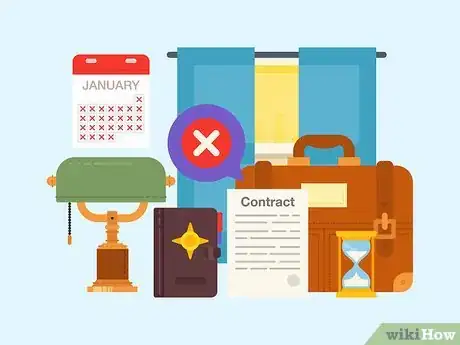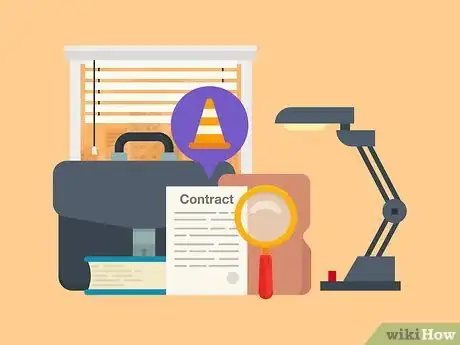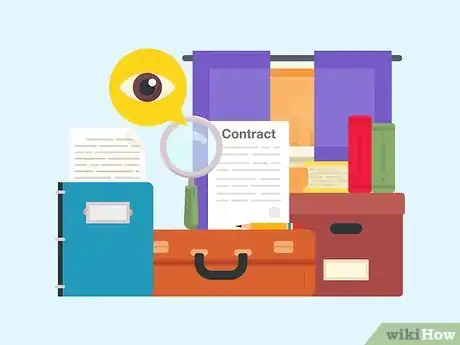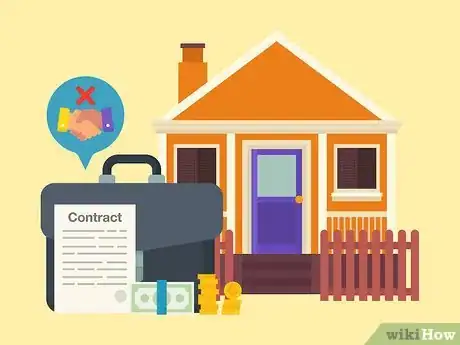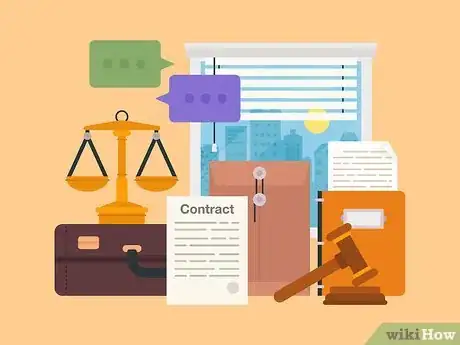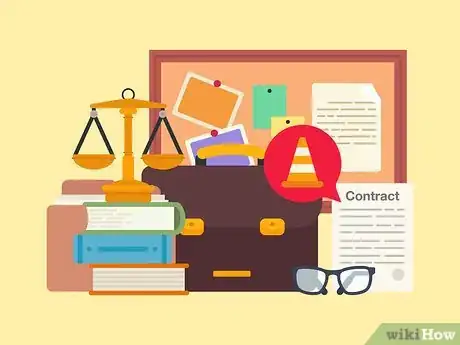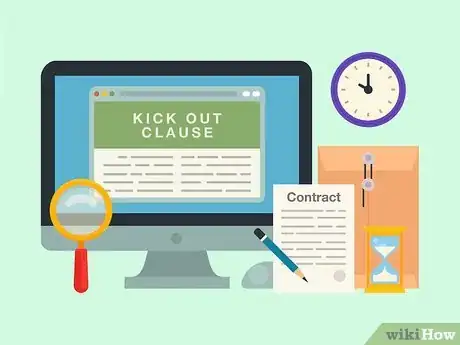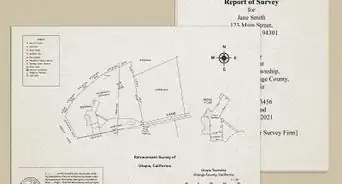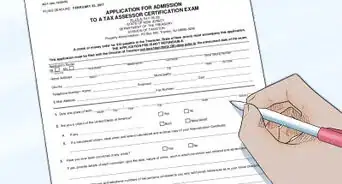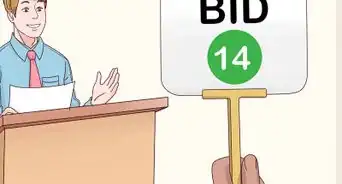This article was co-authored by Carla Toebe. Carla Toebe is a licensed Real Estate Broker in Richland, Washington. She has been an active real estate broker since 2005, and founded the real estate agency CT Realty LLC in 2013. She graduated from Washington State University with a BA in Business Administration and Management Information Systems.
There are 7 references cited in this article, which can be found at the bottom of the page.
This article has been viewed 392,360 times.
The details of how a contract is broken are typically specific to the provisions originally laid out in the contract. But, there are some standard features of real estate contracts which, although not true in all cases, typically allow you to end a deal that you have made. You will need to be very attentive to detail and responsive in ending such a contract. Real estate contracts are constructed to be strong and often have time provisions that make it nearly impossible to alter the arrangement after a predetermined date.
Steps
Canceling a Contract With Your Agent
-
1Recognize the difference between buyers and sellers. If you are in the market to buy a house, it should be easy to break off an arrangement with a real estate agent. As a seller, however, you will find that your agent has invested considerable money toward advertising your property and might be disinclined to let you go. To maintain a good record of customer service, most will allow you to end the relationship, but you could encounter some difficulties.[1]
-
2Look for an opt-out clause. These clauses are common with large, national companies. They allow you to exchange one agent at the company for another. If you have a problem with the individual, but are content with the company, this is a relatively painless way to rectify the situation.[2]
- Other contracts include a termination fee, which allow you to void the contract completely for approximately $300 to $500.[3]
Advertisement -
3Talk to the agent. Most sellers become dissatisfied with their agent because of a failure in communication. It is possible that issues can be resolved in a conversation. If not, the agent will likely allow you to leave contract.
- Discuss whether you want to break the contract with an agent because you have decided not to sell your home, or because you are not happy with the service the agent is providing.
- If there are no provisions in the contract for voiding the agreement, you will often need to negotiate over a termination fee. The agent might ask you to cover the expense of advertising.
- If you do negotiate an early end to the contract, be sure to get the agreement in writing that all of the stipulations of the original contract are void. Oftentimes the original contract will have provisions that would allow the broker to receive commission if you sell the house independent of him.[4]
-
4Wait until the contract is voided. If the agent is unwilling to free you from your contractual obligations, you can simply wait until the contract is voided. Most such contracts are valid for no longer than 6 months.[5]
- If you manage to sell the house during the contract period and you have an exclusive right-to-sell agreement, the agent will be owed a commission, even if you brokered the exchange without their active involvement. But, if it is an exclusive agency agreement or an open listing, you may not have to pay commission to the broker. Be sure to review the listing agreement to determine the commission liability.
- Most brokerages allow a cancellation of the listing agreement without question. If a listing agent has put considerable effort and money into it and the seller wants to cancel before the listing expires, then the listing agent may attempt to be reimbursed but if the listing agreement has no mention of that, then the seller is not obligated.
-
5Find violations in the contract. If the agent is unwilling to release you and you do not want to wait for the contract to expire, the only remaining option is prove a breach of contract. If you can prove that the agent did not perform tasks that are outlined in the contract, you may be able to legally break it.[6]
- This should be a course of last resort, because breach of contract will ultimately need to be proven in court. It is extremely rare that your agent would be inclined to take you to court over a contract. However, alleging breach of contract can quickly escalate the situation.[7]
Canceling a Contract to Buy a Property
-
1Notify your agent immediately that you plan to withdraw from the contract. Whether or not you will be able to cancel your contract without substantial penalty to yourself will often be contingent upon how quickly you act. The rules for cancellation are generally specific to your particular contract. Your agent should be familiar with these provisions.
-
2Cancel at will before signing. Although you have offered a verbal agreement and a bid for the property, this is not binding until all parties have signed a contract. Have your agent or attorney write a formal purchase contract cancellation agreement to the representative of the seller.
- Though you should not have paid a deposit at this phase in the process, if you have, the letter ought to indicate that the money will be returned. Once the letter is received, the contract will be considered void. At this point, the rescission will state who the deposited earnest money will go to, whether it’s the buyer or someone else. Once the seller agrees to the terms of the rescission, the buyer should get the earnest money back.
- The letter should include basic identifying information about the exchange, including the address of the property, the date of the contract, and the name of the parties involved.
-
3Review the contract and title report closely. Ask questions of the title officer if anything is unclear. A buyer can choose to cancel a contract with a title contingency in just about any type of sale except for a sheriff's sale. Buyers should do some advance research about these properties. A buyer will typically have 5 days to cancel the contract once they receive it, but the contract can stipulate something else.
- For instance, make sure the offer states “once received.” If it is only issued to the agent and the agent is out of town for 3 days then you now only have 2 days to review. Review the contract thoroughly for what the contingencies are protecting you for and make sure the timelines are appropriate before giving it to the seller.
-
4Look for “right of rescission” provisions in the contract. Most contracts specify a certain period of time during which the buyer is permitted to void the contract. Generally, the buyer will have 3 days to cancel the contract after receiving the disclosures. Other rescissions are based on specific contingencies in the contract.
-
5Refuse negotiations. In cases where there is some damage to the property or the assessment has come in below the purchase price, contingencies kick in and the buyer has the right to request a revision to the contract or rescind. If either of these situations occur, refuse the negotiations in order to legally get out of the contract.
- For example, with an inspection contingency, the buyer may request repairs or a reduced purchase price. If the seller disagrees, the buyer may choose to rescind. If you are a seller trying to terminate the contract with the buyer, do not allow the requests made by the buyer.
- The buyer can choose to purchase or rescind the offer based on a failed inspection but only the buyer is allowed to cancel the deal at this point and have any earnest money returned. If the seller does not do what the buyer wants, there is a good chance the contract will be rescinded by the buyer but they could still continue to purchase it and waive the inspection contingency.
- With a low appraisal, the buyer has the right to request that the seller lower the purchase price. However, the seller may refuse, in which case the buyer can decide to rescind or pay the extra amount required to make the down payment percentage required, as long as the request or rescission was made prior to the contingency expiring.
-
6Use contingencies. Although they vary with each contract, every real estate contract should include some contingencies upon which the buyer is able to void the contract. Most contracts allow the buyer to conduct a property inspection and ask for revisions of the contract if there is physical damage to the property. Similarly, if you are unable to get funding from the bank or the appraisal determines that the property is priced too high, the contract may be rescinded.
- However, the buyer still has a right to bring in more money if the appraisal was low, as long as they qualify with the lender at the higher purchase price and they have more money to put down. The buyer must choose to rescind the contract before it is terminated. The buyer will be given a period of time to review the regulations if they checked it off in their offer and the seller accepted it in the offer. This is one of the contingencies that are available to all buyers.
- In the case of foreclosures and REO properties, a buyer may or may not be allowed any contingencies but generally, in a traditional sale, a buyer may request this. The seller can refuse any contingency in the offer before the contract has been mutually executed.
- Keep in mind that the offer was already placed and accepted by the seller. There is no offer in place to reject. The buyer must use this contingency and rescind the contract if they take objection after reviewing the association rules and other documents requested. They are generally issued as a part of the title report but if it is new construction, the builder or agent of the builder typically provides them.
- Other contingencies that sometimes appear in contracts include: inability to find sufficient insurance at the price rate the contingency specifies (generally ½ of 1% of the purchase price) and the discovery of liens against the property that cannot be cleared, called a “Title Contingency.”
-
7Be prepared to lose your deposit. If you have allowed your contingencies and right of rescission to expire before breaking your contract, you may lose the earnest money deposit that you put in escrow. The purchase and sale agreement will state what the remedy is if the buyer defaults on the contract. Typically, the earnest money will go to the seller, but it can be the seller’s choice if that’s what is stated.[8]
- Though losing the deposit will be painful, in some sense it protects you by freeing you of any further obligations. The alternative is that the seller can sue for “specific performance.” Although rare, this would force you to do what you promised in the contract, essentially making you go through with the purchase of the property.[9]
- Because real estate contracts are generally solidly written, those who break them will invariably lose if the case goes to court.
-
8Consult with a lawyer about cancellation. If you have decided that you can cancel the contract on acceptable terms, you should immediately consult a lawyer or your agent. Have them void the deal under terms defined by the contract. Act quickly to save your opportunity to claim contingencies.
Cancel a Contract to Sell a Property
-
1Consult your attorney and real estate agent. As a seller, you have fewer opportunities to cancel a contract than a buyer. The consequences of breaking the contract can also be more severe. You should immediately seek professional assistance.
-
2Review the contract for a “kick-out clause.” These are relatively rare. However, some contracts include clauses that stipulate that the seller can escape from her contract if she manages to find a buyer willing to pay more for the property. Such clauses are only valid for a period of time specified in the contract.[10]
- This clause will only, however, allow you to replace one buyer with another. If you have changed your mind about selling the property, this clause might not be the escape route you need.
-
3Be attentive to buyer failures. Often the contract stipulates that the buyer is supposed to fulfill a contingency by a specific date. You can use this to your advantage. If, for example, the buyer fails to get financing within a particular time span, you can use this as justification to void the contract.
- In order to successfully employ this strategy, you’ll need to request that the buyer prove that there’s a loan commitment in place. If the buyer has defaulted on this contingency, then the seller can demand a default and termination of the contract.
- If the contingency has passed already, the buyer will not be able to use it to rescind and get the earnest money back.
- The seller can demand a two day waiver of financing once the contingency has passed and demand a rescission if the buyer will not waive it. A buyer can still buy the property though if they waive the financing. They may have someone give them cash to purchase it. A seller can only demand a rescission when the buyer is in default of the contract terms.
- In order to successfully employ this strategy, you’ll need to request that the buyer prove that there’s a loan commitment in place. If the buyer has defaulted on this contingency, then the seller can demand a default and termination of the contract.
-
4Be prepared to pay. If none of the aforementioned strategies are available to you, you will need to offer a financial settlement. The buyer has the full legal right to sue you, forcing you to sell the house and pay damages. However, depending on her disposition, she might not be inclined to engage in the necessary legal battle. You will need to offer a settlement large enough to dissuade her from following such a course of action.
- In these cases, the buyer has good standing to sue for “specific performance,” which would compel you to proceed with the sale. However, such cases often take years and are extremely expensive. Most buyers would prefer to take a payout. You will need to negotiate over a specific sum.[11]
Expert Q&A
Did you know you can get expert answers for this article?
Unlock expert answers by supporting wikiHow
-
QuestionCan you get out of a real estate contract?
 Carla ToebeCarla Toebe is a licensed Real Estate Broker in Richland, Washington. She has been an active real estate broker since 2005, and founded the real estate agency CT Realty LLC in 2013. She graduated from Washington State University with a BA in Business Administration and Management Information Systems.
Carla ToebeCarla Toebe is a licensed Real Estate Broker in Richland, Washington. She has been an active real estate broker since 2005, and founded the real estate agency CT Realty LLC in 2013. She graduated from Washington State University with a BA in Business Administration and Management Information Systems.
Real Estate Broker There are numerous ways to get out of a real estate contract. Check the contingencies in place to see what may allow you to cancel the contract without losing your earnest money. You will typically have seller disclosures, inspection, title, financing, and insurance contingencies. If any of these pose barriers, as long as you have not waived them or they have not been expired, then use the contingency to get out of the contract. All contracts can be mutually rescinded if all parties agree. If you're out of contingencies, you can hope the seller is agreeable to letting you out with getting the earnest money back but don't count on it if you have no contingencies left.
There are numerous ways to get out of a real estate contract. Check the contingencies in place to see what may allow you to cancel the contract without losing your earnest money. You will typically have seller disclosures, inspection, title, financing, and insurance contingencies. If any of these pose barriers, as long as you have not waived them or they have not been expired, then use the contingency to get out of the contract. All contracts can be mutually rescinded if all parties agree. If you're out of contingencies, you can hope the seller is agreeable to letting you out with getting the earnest money back but don't count on it if you have no contingencies left. -
QuestionCan the seller cancel a purchase agreement?
 Carla ToebeCarla Toebe is a licensed Real Estate Broker in Richland, Washington. She has been an active real estate broker since 2005, and founded the real estate agency CT Realty LLC in 2013. She graduated from Washington State University with a BA in Business Administration and Management Information Systems.
Carla ToebeCarla Toebe is a licensed Real Estate Broker in Richland, Washington. She has been an active real estate broker since 2005, and founded the real estate agency CT Realty LLC in 2013. She graduated from Washington State University with a BA in Business Administration and Management Information Systems.
Real Estate Broker
-
QuestionCan a seller get out of a real estate contract?
 Carla ToebeCarla Toebe is a licensed Real Estate Broker in Richland, Washington. She has been an active real estate broker since 2005, and founded the real estate agency CT Realty LLC in 2013. She graduated from Washington State University with a BA in Business Administration and Management Information Systems.
Carla ToebeCarla Toebe is a licensed Real Estate Broker in Richland, Washington. She has been an active real estate broker since 2005, and founded the real estate agency CT Realty LLC in 2013. She graduated from Washington State University with a BA in Business Administration and Management Information Systems.
Real Estate Broker A seller can get out of a contract but it will be a breach of contract unless the buyer agrees to allow the contract to be rescinded. The buyer can sue the seller for damages unless all parties agree. If the seller wants to get out of the contract, it may be best to negotiate a cancellation with the buyer. The seller should have contingencies in place as well to protect themselves, for example, if the seller is purchasing another home and selling their house, then they should protect themselves with an addendum that will allow them to rescind if their home purchase is canceled. If a seller gets out of the contract by using a contingency, then they will not be in breach of contract.
A seller can get out of a contract but it will be a breach of contract unless the buyer agrees to allow the contract to be rescinded. The buyer can sue the seller for damages unless all parties agree. If the seller wants to get out of the contract, it may be best to negotiate a cancellation with the buyer. The seller should have contingencies in place as well to protect themselves, for example, if the seller is purchasing another home and selling their house, then they should protect themselves with an addendum that will allow them to rescind if their home purchase is canceled. If a seller gets out of the contract by using a contingency, then they will not be in breach of contract.
References
- ↑ http://www.zillow.com/blog/how-to-break-up-with-your-real-estate-agent-74089/
- ↑ http://homeguides.sfgate.com/terminate-contract-real-estate-broker-3114.html
- ↑ http://www.bankrate.com/finance/real-estate/dismiss-real-estate-agent-2.aspx
- ↑ http://www.bankrate.com/finance/real-estate/dismiss-real-estate-agent-2.aspx
- ↑ http://www.zillow.com/blog/how-to-break-up-with-your-real-estate-agent-74089/
- ↑ http://homeguides.sfgate.com/terminate-contract-real-estate-broker-3114.html
- ↑ http://www.bankrate.com/finance/real-estate/dismiss-real-estate-agent-1.aspx
- ↑ http://www.zillow.com/blog/how-to-get-out-of-a-real-estate-contract-106055/
- ↑ http://www.nytimes.com/2001/10/21/realestate/your-home-contracts-are-hard-to-break.html
About This Article
To cancel a real estate contract to buy a property, start by letting your agent know that you intend to do so as quickly as possible, so they can tell you what your options are. If your contract contains a title contingency, you can cancel the contract within 5 days of receiving the title report. Alternatively, you could rescind your offer after the inspection, especially if the property needs repairs. Once the contingencies have expired, you can still default on the contract, but be aware that you may lose the deposit money that you put down on the property. For advice from our Real Estate co-author on how to cancel a real estate contact if you’re the seller, read on!



